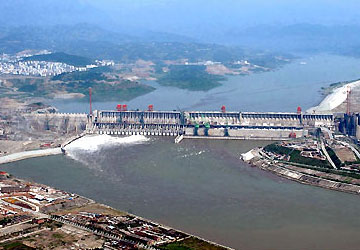Dr. Assaf Rosenthal

Some time ago I wrote about the environmental damage caused by dams that were built without comprehensive thought that includes future (environmental) consequences. Now the World Organization for the Conservation of Nature WWF came out with a call "not to build dams without a detailed examination of the future impact on the natural environment and the human societies that will be affected by the construction of the dam". According to the organization's spokespersons, many of the dams caused irreversible damage to their environment.
In 1998, the "World Commission on Dams" was established. The commission was established by the United Nations with the aim of bridging the "green" movements and the desire to protect the environment, and the need to develop electricity sources and accelerated economic development.
"Despite the instructions and recommendations given to their builders by the World Commission on Dams, in the inspection of the committee over the past five years, its members showed that dams cause the disappearance or drying up of (natural) water bodies, which are an important source of water, dams cause the disappearance and risk to animals Bar and fish, the promise of cheap electricity and water to irrigate agriculture, is violated by damage to the local economy and at the end of the process, residents are forced to evacuate settlements and pay more for various services.
In the XNUMXs, the dam builders were the "bearers of the miracle of progress", today the damage that dams can cause is known and this knowledge must be incorporated into planning, planning that will be submitted to public, professional, economic, and environmental scrutiny, a scrutiny that will enable the planning and construction of a dam so that local "populations" will benefit from it and its benefits will be sustainable.
In Belize, the Chalilo Dam was built with the aim of lowering electricity prices, but since its construction, electricity prices have been raised by 12% and during its construction, 10,000 dunams of natural forest areas were flooded/submerged (according to the World Conservation Organization, the Ermanek Dam (in Turkey) cost six hundred and fifty million dollars, The dam together with five other power plants will dry up the Gasco delta, which was declared "of global importance" by the Ramsar Convention (the international convention for the protection of bodies of water).
In Laos, the lives of 50,000 villagers were taken when a dam built with World Bank financing diverted the water from a river from which they lived, the diversion of the river caused an increased flow in the river on which the water was blocked. And the result: damage to fish, and flooding of agricultural areas. The builders of the Maloner Dam in Spain did not consider cheap and simple options for supplying water. to Seville, and the economic cost is clear. Burnett Dam in Australia is not economic, but endangers the population. A unique sighting fish.
Dams cut off 60% of the largest rivers in the world, dams caused the "resettlement" of 80 million people, today there are about 400 dams under construction and hundreds more in planning without guidance and consideration of the environment will cause additional damage - environmental and social, with the main damage being to societies/populations in the vicinity the dams
Bad dams and a bad economy are still "standing and kicking" five years after the establishment of the advisory and supervision committee, its people must know how to choose the right solutions to the energy problems, solutions without harm. in the environment and maximizes positive feedback for the population.
Dr. Assaf Rosenthal
Tour guide/leader in Africa and the Dram
For details, phone 08 6372298 / 0505640309
Email
assaf@eilatcity.co.il
A compilation of Dr. Assaf Rosenthal's articles on the Hidan site
https://www.hayadan.org.il/BuildaGate4/general2/data_card.php?Cat=~~~376937449~~~218&SiteName=hayadan
